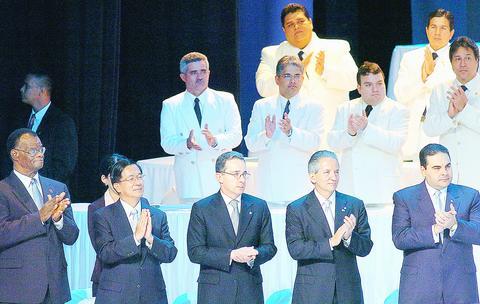Pointing to what they called Taiwan's political and economical achievements, the presidents of two Caribbean nations on Wednesday told President Chen Shui-bian (陳水扁) that "Taiwan is the dream model" for them in developing their own countries.
"They expressed admiration at Taiwan's political and economic achievements, and both the Haitian president and the Dominican Republic president told President Chen that they wanted to develop their countries to become the Taiwan of the Caribbean," said Presidential Deputy Secretary-General James Huang (

PHOTO: LIU HSIN-TE, TAIPEI TIMES
The Caribbean leaders made the remarks in separate meetings with Chen, which were held on the same day as the inauguration ceremony of Panamanian President Martin Torrijos on Wednesday, Huang said.
Bilateral meetings with Costa Rica, Honduras and Guatemala -- all diplomatic allies of Taiwan -- were also held that day, Huang said.
Huang said that the various heads of state expressed the desire to strengthen economic ties with Taiwan and to attract investor interest in their countries.
Chen also told his Caribbean counterparts of the growth in the Panamanian economy since Panama signed a free-trade agreement with Taiwan.
Trade volume between the two countries was US$130 million for last year, but in the first six months of this year, trade volume surged to US$140 million, with Panama's exports to Taiwan registering annual growth of 563 percent.
"All the leaders expressed their support for Taiwan," Huang said. "They told President Chen that they support Taiwan not because they receive financial aid but because they really find Taiwan's political and economic achievements to be admirable and that they share Taiwan's values," Huang said.
Noting that his country had suffered terribly from civil war, Guatemalan Vice President Eduar-do Stein was quoted as telling Chen that he could understand the unjust circumstances Taiwan is facing, adding that his country would "support Taiwan unconditionally to join international organizations and obtain its deserved place in the international community."
A meeting with the Organization of American States' (OAS) incoming general secretary, Miguel Angel Rodriguez Echeverria, was also arranged, during which Chen expressed the hope that the organization would accept Taiwan as an observer.
Chen reportedly told Rodriguez that nearly one-third of the organization's members are Central or South American countries with close ties to Taiwan, and that Taiwan could make a major contribution to the economic network of the region should it become an OAS observer nation.
In response, Rodriguez, also a former president of Costa Rica, told Chen that he had told Taiwan's former representative to the US, Chen Chien-jen (程建人), that Taiwan had to utilize a diplomatic strategy to obtain the support of all OAS member nations.
"[Rodriguez] said he believed that Taiwan should be able to achieve the goal of joining the OAS if it applies diplomatic wisdom," Huang said.
Meanwhile, Minister of Transportation and Communications Lin Ling-san (林陵三), who is accompanying Chen on the trip, said on Wednesday that Taiwan's participation in Panama's plan to widen the Panama Canal would be a boost to Taiwan's economy as well as ties between the two nations.
Lin made the comments while touring the Panama Canal with Chen.

US climber Alex Honnold is to attempt to scale Taipei 101 without a rope and harness in a live Netflix special on Jan. 24, the streaming platform announced on Wednesday. Accounting for the time difference, the two-hour broadcast of Honnold’s climb, called Skyscraper Live, is to air on Jan. 23 in the US, Netflix said in a statement. Honnold, 40, was the first person ever to free solo climb the 900m El Capitan rock formation in Yosemite National Park — a feat that was recorded and later made into the 2018 documentary film Free Solo. Netflix previewed Skyscraper Live in October, after videos

NUMBERS IMBALANCE: More than 4 million Taiwanese have visited China this year, while only about half a million Chinese have visited here Beijing has yet to respond to Taiwan’s requests for negotiation over matters related to the recovery of cross-strait tourism, the Tourism Administration said yesterday. Taiwan’s tourism authority issued the statement after Chinese-language daily the China Times reported yesterday that the government’s policy of banning group tours to China does not stop Taiwanese from visiting the country. As of October, more than 4.2 million had traveled to China this year, exceeding last year. Beijing estimated the number of Taiwanese tourists in China could reach 4.5 million this year. By contrast, only 500,000 Chinese tourists are expected in Taiwan, the report said. The report

Temperatures are forecast to drop steadily as a continental cold air mass moves across Taiwan, with some areas also likely to see heavy rainfall, the Central Weather Administration (CWA) said. From today through early tomorrow, a cold air mass would keep temperatures low across central and northern Taiwan, and the eastern half of Taiwan proper, with isolated brief showers forecast along Keelung’s north coast, Taipei and New Taipei City’s mountainous areas and eastern Taiwan, it said. Lows of 11°C to 15°C are forecast in central and northern Taiwan, Yilan County, and the outlying Kinmen and Lienchiang (Matsu) counties, and 14°C to 17°C

STEERING FAILURE: The first boat of its class is experiencing teething issues as it readies for acceptance by the navy, according to a recent story about rudder failure The Hai Kun (海鯤), the nation’s first locally built submarine, allegedly suffered a total failure of stern hydraulic systems during the second round of sea acceptance trials on June 26, and sailors were forced to manually operate the X-rudder to turn the submarine and return to port, news Web site Mirror Daily reported yesterday. The report said that tugboats following the Hai Kun assisted the submarine in avoiding collisions with other ships due to the X-rudder malfunctioning. At the time of the report, the submarine had completed its trials and was scheduled to begin diving and surfacing tests in shallow areas. The X-rudder,